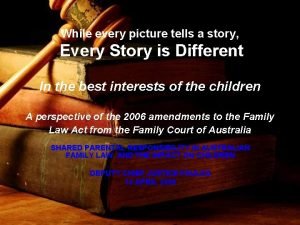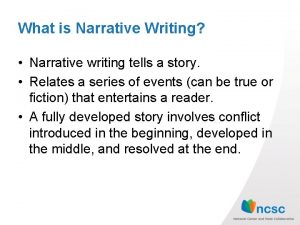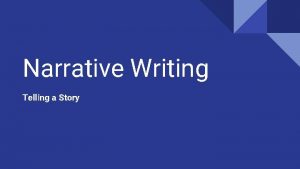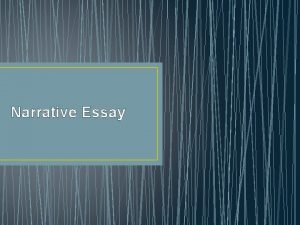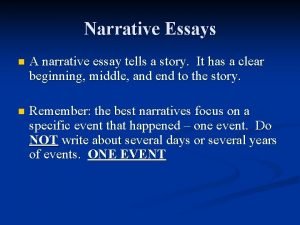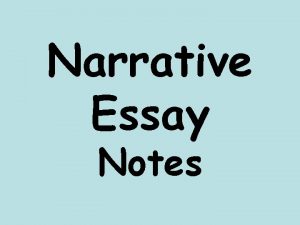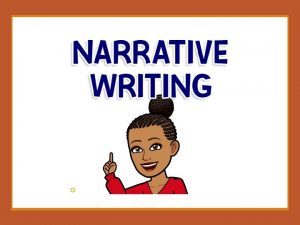Narrative Essay Narrative Essay Tells a story Every







- Slides: 7

Narrative Essay

Narrative Essay • Tells a story • Every time you tell a joke, trade gossip, invent a ghost story or tell what you did on the weekend, it is a narrative • Your idea/thesis may be formed by experience, so a clear account of that experience will help others understand believe your point • Eg. The experience of war through story. The experience of growing up in a story. Use story to prove a point • Often written in 1 st person as it is based on a personal story

Elements of a narrative essay 1. Sensory details- show don’t tell!!! • • Eg. (telling) I got into a fight. (showing) The fist hit me square in the nose. (telling) I love to help others. (showing) The elderly lady smiled when I held open the door for her. I felt a warm glow fill my body. 2. Time order- time is your organizer. Mostly chronological but it can have flashbacks or begin in the middle of the story 3. Thesis- the controlling idea. Some are stated explicitly, some implicitly.

§ Since this is a story, the narrative essay needs everything a story needs (these are known as the story elements): • Has characters • Has a plot (beginning/middle and end) • Has a problem • Has a climax • Can use dialogue

Thesis- Step #1 Determine your purpose • The foundation of your essay • Your opinion about the topic Weak Thesis Why it is weak Revised thesis In this essay I will discuss my family’s move to Canada Not an opinion Not specific My family’s move to Canada was a distressing experience from which I learned that not all Canadians are hospitable and to survive this country, you have to stand up for yourself The birth of my brother, Not a complete Mark. sentence Not an opinion Not specific The birth of my brother, Mark, brought joy and renewed energy to our household.

To consider when writing narrative • Choice of scope- where does your story logically begin and end? Include only parts that develop your point. Eg. I became a Canadian citizen when I walked through the courthouse doors. • Choice of details- Which details count and what do not? Ever read a story where they give you every detail about their lunch? Brushing their teeth? Who cares! Unless it adds to your argument. Use vivid details. You want the reader to see, hear, feel and smell or taste your experience. • Choice of connection- readers love to be swept along by narrative. Use connecting words such as “at first, next, then, immediately, later, finally, at last”. • Choice of narrator- first person (your experience) or from a third person perspective (someone else’s story)

Conclusion • Give the reader a sense of satisfaction. They should feel that the story is complete, loose ends tied up. • Ideas for a concluding paragraph: • • Come full circle- return to your introduction and its material Summarize the lesson you learned from the experience Remind your readers of thesis by stating it in different words Consider placing thesis in the conclusion. Sometimes you may want to do this if you want it to be a surprise.
